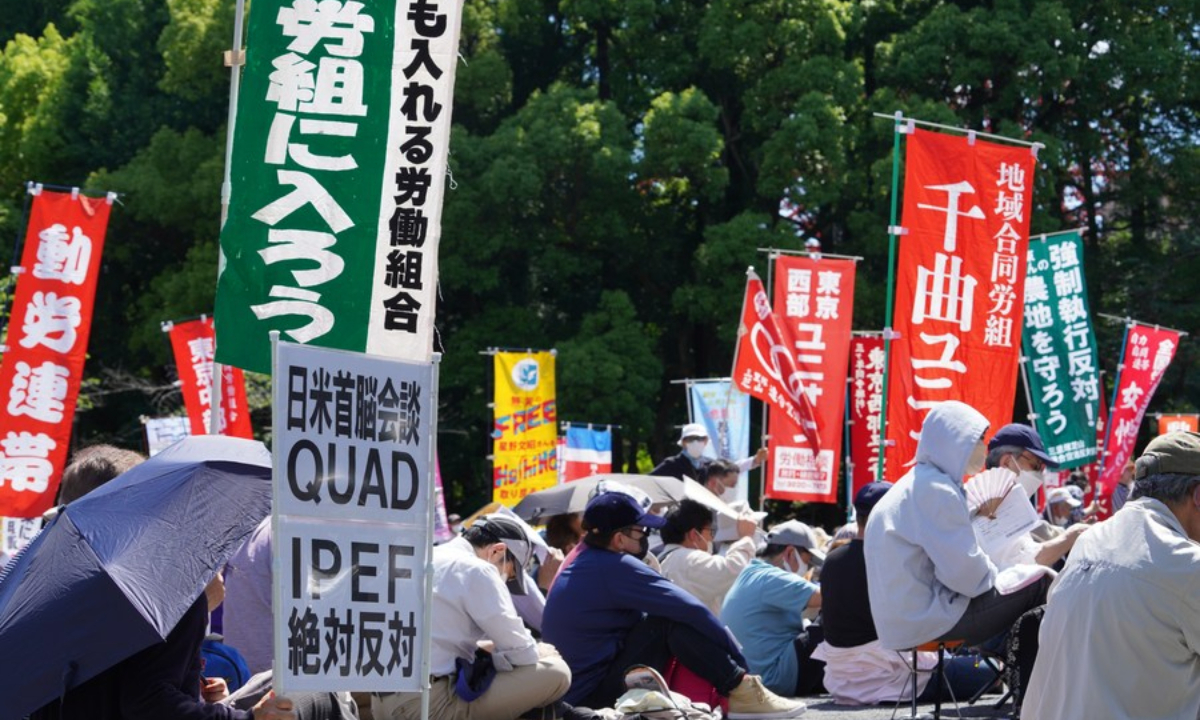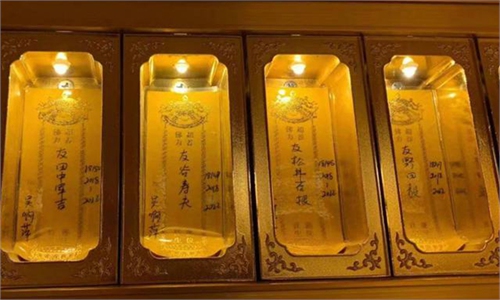Japan slammed for seeking excuses for military expansion by hyping threats from neighbors in annual defense report

Protesters gather at Shiba Park to demonstrate against the upcoming US-Japan summit and the summit of the Quadrilateral Security Dialogue (Quad), in Tokyo, Japan, May 22, 2022. Photo:Xinhua
China on Friday denounced Japan over its annual defense white paper, as it outlined China and other neighbors as "threats" in a bid to gain more domestic support to boost the defense budget and amend the pacifist constitution. Chinese analysts said that Japan's aggressive, condemnatory and containing mentality toward China is stronger and more straightforward . Besides, the emphasis of the white paper on active attack capability also reflects the strengthening of the right in Japanese politics.
China is mentioned 51 times in the English version of the 28-page report while Russia appears 40 times. It viciously listed China's military development along with the Russia-Ukraine conflict while brazenly saying that "deterrence is essential for both defending Japan and creating peace."
It described the Chinese island of Taiwan as an "extremely important partner," while smearing the Chinese mainland for attempting to "change the status quo by coercion in the East China Sea and the South China Sea," and the lack of transparency in defense policy and military affairs.
On Friday, Chinese Foreign Ministry spokesperson, Wang Wenbin, expressed strong opposition against the white paper which is "vilifying China's national defense policy, normal military development and legitimate maritime activities, hyping up the so-called China threats and interfering in China's internal affairs on the Taiwan question."
China adheres to the path of peaceful development and pursues a national defense policy that is defensive in nature, Wang said. He noted that Japan, a country with a history of militarism and aggression, publicly announced in its white paper that it would revise its defense documents, increase its defense budget and develop counter-attack capabilities, raising concerns that Tokyo is moving further away from pacifism and "exclusively defense-oriented policy."
We urge Japan to immediately stop seeking excuses for its military expansion by playing up security threats from its neighbors, deeply reflect on its history of aggression, stick to the path of peaceful development and take concrete actions to win the trust of its Asian neighbors and the international community, Wang said.
China's embassy in Japan responded saying on Friday that the 2022 white paper maintains a wrong position and negative tone, maliciously slanders and accuses China, grossly interfers in China's internal affairs and seriously violates the spirit of the four political documents between China and Japan.
The biggest challenge to regional peace and stability is Japan's reckless right-wing provocations in the East China Sea and its saber-rattling in the South China Sea with the US and other allies, the embassy said.
The South Korean Foreign Ministry on Friday also condemned Japan for its sovereignty claims over the South Korea's easternmost islets of Dokdo, called Takeshima by Japan.
The white paper also criticized Russia's aggression against Ukraine in a new chapter on the Russia-Ukraine conflict. It also hyped China-Russia military cooperation, which could make for a direct impact on the security environment surrounding Japan.
The white paper also highlights North Korea's missiles launch and further provocations, which pose grave and imminent threats to Tokyo's security.
The current edition of the white paper contains more obvious, straightforward, aggressive and condemnatory references against China, Da Zhigang, Director of the Institute of Northeast Asian Studies at Heilongjiang Provincial Academy of Social Sciences, told the Global Times on Friday.
It is also clear that Japan is targeting China, Russia and North Korea to justify increasing its defense budget and military capabilities, Da said.
For example, the white paper mentioned long-range missiles and counterattack capabilities. It sets the stage for the year-end security review expected to call for the acquisition of longer-range missiles, according to Reuters.
In one of the biggest changes in recent years, Japan has moved beyond exclusively defense-oriented policy, Lü Yaodong, research fellow with the Institute of Japanese Studies under the Chinese Academy of Social Sciences, told the Global Times on Friday.
Japan began to seek the ability to pre-emptively destroy enemy missiles and expanded targets from North Korea to China and Russia, Lü said.
The white paper clearly shows the Japanese military priorities for the future cover an increased military spending and offensive capability that includes attacking critical infrastructure, Da said.
Experts said Japan was relatively careful in when it comes to China and Russia in the previous white papers because it did not want to affect the business. However, Japan is becoming more straightforward, giving people a feeling that it would rather risk economic losses to strengthen its military.
Lü highlighted the fact that conservative lawmakers who support amending article 9 of Japan's pacifist constitution now surpassed two-thirds of the seats in both houses of parliament, which meets the condition to initiate the a constitutional reform. "The political shift to the right will be further intensified," he said.
Although the Japanese parliament has initially met the conditions, the government still needs to work on the integration of opinions, especially the general acceptance of the elite, Da said, adding that "the white paper is a way to guide public opinion ahead of the constitutional amendment."


